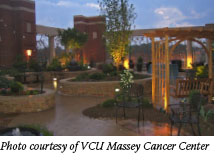
Healing Garden Grows at Massey Cancer Center
The new healing garden at Virginia Commonwealth University's (VCU's) Massey Cancer Center offers patients, family members, and medical staff a chance to be around nature and to escape, if for only a little while, the stress and stimulation of a clinical environment.
"The garden was created to nourish and to inspire those who use it," says Becky Massey, a member of the cancer center's advisory board who came up with the idea of the garden and led the fund-raising.
Last month, the garden, which features curved pathways and raised planters, opened as part of an addition that includes a state-of-the-art research facility.
"The garden offers another aspect of healing that goes along with medicine but is different from medicine," says Ms.
Massey. "These are the benefits of nature that come from plants and wonderful light and the trickling of water."
The restorative power of gardens is an ancient idea that has recently come into vogue. Last year, new gardens designed to promote health and well being opened at Massachusetts General Hospital, at the Fred Hutchinson Cancer Research Center, and at the NIH Clinical Center.
 The Massey Healing Garden, in Richmond, Va., is growing shade trees, perennials, evergreens, shrubs, vines, and groundcovers. Water sculptures and a tranquil pool add to the atmosphere. The Massey Healing Garden, in Richmond, Va., is growing shade trees, perennials, evergreens, shrubs, vines, and groundcovers. Water sculptures and a tranquil pool add to the atmosphere.
Views from the garden are framed by bronze screens that borrow design elements such as birds and reeds from the nearby Egyptian Building, which was the original medical school built in 1845.
Though at street level, the garden is actually built on the roof of an underground parking garage. The planters are at different heights to accommodate the roof's piping and the garden's irrigation system.
Situated between new laboratories and a clinical center, the garden is a symbolic link between research and treatment. The connection is appropriate given the role of plants in developing some cancer medicines.
The garden has plants with anticancer properties, including the yew tree, which was the original source of the drug paclitaxel; Madagascar periwinkle, which is used to make the drug vinblastine; and autumn crocus, which makes a substance tested against leukemia.
But most of the plants come from everyday life, and the healing aspect is intended to come from this very familiarity.
"The focus is on life rather than illness," says Ms. Massey, adding that plants with strong scents are absent because some cancer treatments increase sensitivity to them.
In nice weather, support groups have met in the garden because the setting is much more relaxing than a conference room.
Another use might be as a waiting room. Several oncology nurses recently came up with the idea of giving patients electronic buzzers like those used at restaurants. Administrators are exploring this possibility.
In the meantime, for a sick patient, a stressed relative, or a tired nurse, the garden will be a temporary "place of peace" in the midst of dealing with illness and pain, Ms. Massey wrote recently in the Richmond Times-Dispatch.
"Perhaps it will mean the difference between a bad day and a hopeful day," she wrote.
|